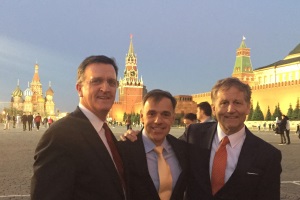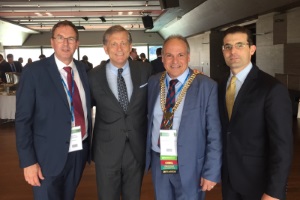Submit Abstracts for the STS Annual Meeting
Share your research with an international community of cardiothoracic surgery professionals. The Society is accepting scientific abstract submissions for its 55th Annual Meeting, to be held January 27–29, 2019, in San Diego, California.
Abstracts and surgical videos may be submitted in the categories of adult cardiac surgery, congenital heart surgery, general thoracic surgery, basic science research, critical care, quality improvement, geriatrics, and cardiothoracic surgery education. Abstracts that address multidisciplinary approaches will be strong contenders for a Sunday program geared toward allied health.
All accepted abstracts are published in the official Annual Meeting Abstract Book, and corresponding manuscripts are to be submitted for publication consideration in The Annals of Thoracic Surgery. Visit sts.org/abstracts to review the abstract submission instructions and policies and get started.
The submission deadline is Friday, August 24—more than 2 months later than in previous years, helping to ensure that the educational program will feature the most up-to-date information in the specialty. Details about late-breaking abstract submissions will be provided later this year. If you have questions about abstract submission, contact
the STS Education Department.
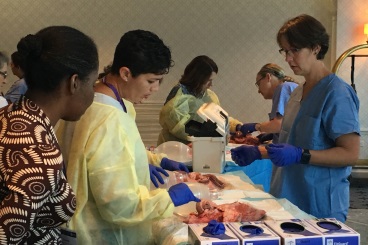
Attendees will gain hands-on experience with the latest critical care technologies.
Stay at the Forefront of Critical Care
Advance your knowledge of cardiovascular and thoracic (CVT) critical care at the 15th Annual Multidisciplinary Cardiovascular and Thoracic Critical Care Conference, October 4-6 in Washington, DC.
This 2.5-day conference was designed for the entire CVT critical care team and will cover the complex nature of CVT critical care, including the unique physiology, array of procedures, and potential complications pertaining to it. Leading experts will present new concepts, technologies, management protocols, and clinical experiences.
“Patients undergoing cardiothoracic surgery today are older and more complex, so there’s an increased risk of complications,” said course co-director Nevin M. Katz, MD. “We’ve developed many new tools to meet these challenges, so it’s important for the entire team to come together and learn how to best deploy these strategies for their patients.”
Some of the topics that will be covered at the conference include aortic emergencies, infections, extracorporeal membrane oxygenation, renal and gastrointestinal complications, respiratory support, neurologic issues, and coagulopathies.
Speakers will include a wide-ranging group of multidisciplinary health care professionals, and attendees can look forward to panel discussions, abstract presentations, and hands-on breakout sessions.
“The ICU is the hub of patient care,” said course co-director Thomas E. MacGillivray, MD. “That’s where surgeons, advanced practice providers, nurses, pharmacists, respiratory therapists, perfusionists, and other consultants come together. The team-based approach is a central focus of this conference, and that’s why we’re encouraging all members of the team to attend.”
View the full agenda and register for the meeting at sts.org/criticalcare. Early bird rates will expire after September 5.
Register Your Team for AQO Meeting
Registration and housing are now open for Advances in Quality & Outcomes: A Data Managers Meeting, September 26-28 in Hollywood, California. This popular annual event highlights what’s new with the STS National Database and offers valuable educational sessions on evidence-based practice to improve outcomes, as well as important networking opportunities.
Two topics covered at this year’s meeting will be the specification upgrade for the General Thoracic Surgery Database (GTSD), which went into effect on July 1, as well as the specification upgrade for the Congenital Heart Surgery Database (CHSD), which will go into effect on January 1, 2019.
The schedule also has been modified so that the GTSD and CHSD sessions will be held on different days, and the Adult Cardiac Surgery Database (ACSD) session will be Thursday afternoon and all day on Friday. During the Thursday ACSD session, a new breakout on “Using Data to Drive Quality” will include updates about the STS Intermacs Database.
The AQO conference is designed for data managers of all experience levels. Primary data contacts and new data managers are strongly encouraged to attend. Surgeons also are urged to consider attending the conference along with their data managers. Don’t forget—attendees will receive free access to AQO Online for sessions corresponding to their registration!
Register and reserve housing at sts.org/AQO. Secure your spot by Wednesday, August 29, for early bird pricing; after this date, registration fees will increase by $100.
STS Has Presence at ASCVTS, ESTS Meetings
President Keith S. Naunheim, MD and other STS leaders represented the Society recently at the annual meetings of two international cardiothoracic surgical societies. After attending The Asian Society for Cardiovascular and Thoracic Surgery (ASCVTS) Annual Meeting in Moscow, Russia, Dr. Naunheim flew to Ljubljana, Slovenia, to attend the European Society of Thoracic Surgeons (ESTS) Annual Meeting.
|
|
|
Avoid Payment Cut by Reporting Quality Data through STS
Cardiothoracic surgeons participating in the STS Adult Cardiac Surgery Database and—new for 2018—the STS General Thoracic Surgery Database can avoid a Medicare penalty by reporting their performance on specific quality measures to the Centers for Medicare & Medicaid Services’ Merit-Based Incentive Payment System (MIPS) through the Society.
The MIPS program consists of four categories—Quality, Cost, Advancing Care Information, and Improvement Activities. Because the STS National Database has been designated a Qualified Clinical Data Registry for MIPS reporting in 2018, STS can report data to CMS on quality measures—14 for adult cardiac and eight for general thoracic—on behalf of surgeons who have signed a consent form.
Eligible professionals who do not satisfactorily report at least six quality measures with 60% data completeness spanning the January 1–December 31, 2018 reporting period may be subject to a 5% negative payment adjustment in the 2020 Medicare Part B Fee Schedule. In addition, surgeons potentially could qualify for a small to moderate upward payment adjustment depending on performance and the number of measures and activities reported under MIPS.
Even surgeons whose hospitals are already reporting for them may benefit from reporting via the Society, as CMS will count the highest-scoring measures.
A new consent form must be signed every year. The consent form must be submitted by Wednesday, October 31, 2018, and can be accessed at sts.org/MIPS-reporting. This service is free for STS members.
If you have questions about MIPS quality reporting, contact Derek Steck, Contracts Manager, STS National Database.
NQF Endorses Lobectomy Composite
The National Quality Forum (NQF) has endorsed an additional STS composite score, bringing the Society’s total number of NQF-endorsed measures to 35, more than any other medical specialty society. The newly endorsed lobectomy for lung cancer composite score measure includes risk-adjusted mortality and major complications for patients undergoing this procedure.
NQF endorsement is the gold standard for health care quality, and NQF-endorsed measures are recognized by the national health care community as “best in class,” evidence-based, and scientifically valid. NQF evaluates measures using four major criteria: importance to measure and report, scientific acceptability of measure properties, feasibility, and usability and use. Major health care purchasers and payers, including the Centers for Medicare & Medicaid Services, rely on NQF endorsement to ensure that measures are scientifically sound and meaningful.
Learn more about the Society’s quality performance measures at sts.org/qualitymeasures or contact Mark Antman, Senior Manager, Quality Metrics and Initiatives.
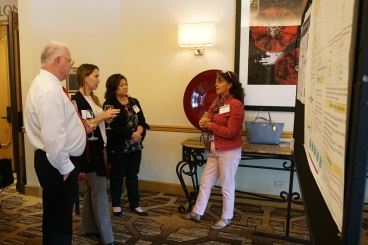
STS Offers Insights into MCS Devices
Mechanical circulatory support (MCS) is an evolving treatment for heart failure patients. Held on May 11–12 in Rosemont, Illinois, the 2018 STS Intermacs Meeting provided more than 100 attendees with the latest updates on patient-reported outcomes, science, clinical trials, adverse events, and technologies related to FDA-approved MCS devices. Participants also learned about new initiatives and research opportunities related to the STS Intermacs Database. Check out photos of the engaging sessions, poster and networking reception, and award presentation at sts.org/intermacsphotos.
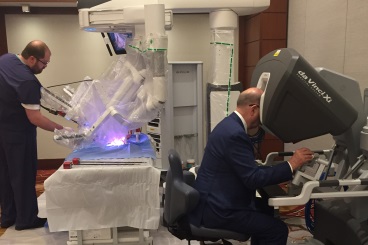
Hands-On Experience Emphasized at Robotics Symposium, ECMO Course
Robotic surgery is being widely incorporated into many general thoracic surgical practices. In view of this trend, the STS Symposium on Robotic Thoracic Surgery, held May 18-19 in Chicago, provided surgeons and their teams with a detailed overview of launching a successful robotics program within a hospital setting. In addition to lectures from well-known experts, there was plenty of time for participants to test their skills on several robots and simulators.
Attendees at the STS/ELSO ECMO Management Symposium, held July 13-15 in Tampa, Florida, also received extensive hands-on experience. More than 60 attendees met with world class instructors to learn the latest in ECMO management.
To view more photos from the robotics course, visit sts.org/robotic-thoracic-photos. To view photos from the ECMO course, visit sts.org/ecmo-photos.
Express Your Interest in STS Leadership Positions
All members are invited to participate in the Society’s self-nomination process for standing committee and workforce appointments. Submissions will be accepted September 1–30. You will receive an email with further information on how to self-nominate.
A full list of the Society’s standing committees and workforces can be found at sts.org/leadershipstructure. Leadership appointments are approved by the STS Executive Committee each year, usually during its December meeting. Leadership appointments for 2019–2020 will take effect immediately after the STS 55th Annual Meeting in San Diego, January 27–29, 2019. The majority of open positions are for 3-year terms, renewable on a one-time basis.
If you have questions about the STS leadership structure or the self-nomination process, contact Grahame Rush, Associate Executive Director.
Apply for TSF Awards
Application submission is now open for a number of awards, fellowships, and scholarships from The Thoracic Surgery Foundation (TSF), the Society’s charitable arm. Funding is available for research programs, educational fellowships, leadership courses, and surgical outreach missions.
Receiving a TSF award can be a springboard for your research career. Bo Yang, MD, PhD, an Assistant Professor of Cardiac Surgery at the University of Michigan, received a TSF Research Grant in 2015 for his work looking at the effect of a certain growth factor mutation on myocardin-dependent smooth muscle differentiation. The funding helped him generate sufficient preliminary data to earn a National Institutes of Health K08 award in 2016 and an R01 grant this year. “The TSF’s support was essential in helping me develop my academic career as a junior surgeon,” Dr. Yang said.
Learn more at thoracicsurgeryfoundation.org/awards and submit your application by September 15.
Foster the Next Generation of Cardiothoracic Surgeons
Help support the future of the specialty by encouraging general surgery residents and medical students interested in cardiothoracic surgery to apply for a 2019 STS Looking to the Future Scholarship.
Scholarship proceeds include complimentary registration for the STS 55th Annual Meeting and Tech-Con 2019 in San Diego, a 3-night stay at an STS-designated hotel, participation in exclusive events, an assigned mentor to help plan a schedule of educational programming and facilitate introductions, and reimbursement of up to $500 in related travel expenses.
If you know of a general surgery resident or medical student who may qualify for an LTTF scholarship, encourage him or her to apply. You also can offer to write a letter of recommendation on the applicant’s behalf.
Application details will be available at sts.org/lttf in mid-August. For more information, contact Rachel Pebworth, Affiliate Manager, Awards and Operations.
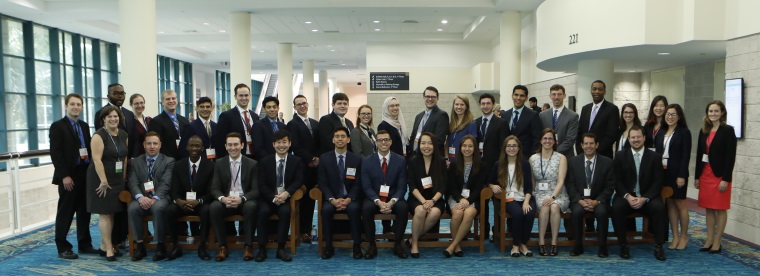
2018 LTTF Scholarship recipients learned about the specialty at the STS Annual Meeting in Fort Lauderdale.
Catch Up with the STS Podcast
Listen to words of wisdom from STS leaders via the Society’s podcast, Surgical Hot Topics. In the latest episode, STS Director-at-Large Shanda H. Blackmon, MD, MPH provides 10 tips on how to attract more female candidates into the specialty. In addition, presidential addresses from the five most recent Past Presidents—Douglas E. Wood, MD David A. Fullerton, MD, Mark S. Allen, MD, Joseph E. Bavaria, MD, and Richard L. Prager, MD—are available. Stream episodes at sts.org/podcast; you also can subscribe through iTunes, Google Play, or wherever you get your podcasts.
Member Disciplined for Ethical Violation
The Society recently sent a letter of admonition to one of its members for violating Sections I.E and II.B of the STS Statement on the Physician Acting as an Expert Witness in the course of providing testimony in a malpractice case. The underlying litigation was based on the treatment of an adult patient who underwent repair of an aortic dissection and experienced complications involving femoral cannulation that ultimately led to part of the patient’s leg being amputated.
Acting on the findings and recommendations of a Preliminary Review Panel, the Standards and Ethics Committee found that the admonished member’s limited experience with adult aortic dissections at the time that the operation at issue took place did not qualify that member as sufficiently familiar with the relevant standards of care that governed adult aortic dissections and femoral cannulation “at the time of the alleged occurrence” (violation of Section I.E). The Committee also found that the admonished member failed to distinguish adequately between actual negligence and an unfortunate medical outcome, testifying unequivocally that the femoral cannula was kept in place for too long, that it could have safely been moved to the ascending aorta or the aortic arch, that it was negligent not to do so, and that the patient’s complications could have been avoided if it had been done. The Committee observed that aortic dissection repairs are complex procedures that involve a great many possible outcomes, and at the time of the operation, it would not have been uncommon for a patient to experience negative complications such as amputation, even if the procedure had been performed perfectly. Nevertheless, the Committee found the admonished member never acknowledged that the complications at issue in the litigation could have occurred as a result of medical uncertainty rather than negligence (violation of Statement II.B).
The Society’s policy on disciplinary action describes admonition as “a written notification, warning, or serious rebuke.” The Committee’s action to admonish the member in question was reviewed and approved by the STS Executive Committee. Visit sts.org/ethics or contact Avidan Stern, STS Associate General Counsel, for additional information regarding this area of STS activity.
